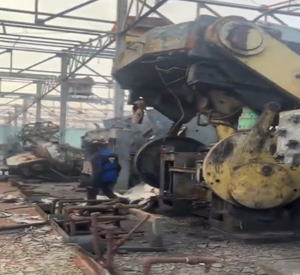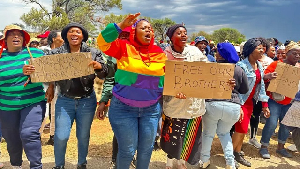One of the police vehicles hit by the diesel shortageThe Ghana Police Service is reeling under an unprecedented diesel shortage, compelling the internal security agency to ground most of its fleet that run on the heavy fuel.
The shortage began some five days ago after the main supplier, Tema Oil Refinery (TOR), shut down the supply line as it encounters financial challenges from the treasury to meet import bills.
In view of the financial encumbrance it is facing, a source at the strategic crude oil import and refining organization told DAILY GUIDE that it has no option but to cut the supply line of diesel to the Ghana Police Service.
A visit to Police Transport Unit close to the DVLA Headquarters in Accra shows most of the operational vehicles parked, making patrolling difficult for the personnel.
The security organization, DAILY GUIDE has learnt, depends on diesel for most of its operational vehicles.
The diesel shortage, necessitated by the TOR action, is only the tip of the iceberg of fiscal challenges facing the government in the past few weeks, DAILY GUIDE has gathered.
Government would have to order an emergency intervention of a sort to remedy the rather deteriorating economic situation of the country.
DAILY GUIDE has learnt that the situation is gloomy and that what is happening to the Police is a reflection of a national situation.
The country’s import bill for oil, information reaching the paper from key financial institutions suggests, has gone past the mandatory 90-day credit standard.
In the oil business, a country such as ours depends on a group of creditors to meet its import requirements such as oil.
In our case, BNP Paribas which manages our oil import through a credit facility, is frowning at the unusual delay in meeting the country’s side of the deal.
They have indeed threatened to punish Ghana for the unseemly behaviour which is said to be against international trade arrangements, especially as the payments for both the last quarter for 2008 and first quarter of 2009 remain unsettled.
An anonymous source has disclosed to DAILY GUIDE that the country risks losing the credit facility it is enjoying from BNP Paribas if an alternative arrangement is not sought to contain the emerging debacle.
The worst-case scenario will see the government resorting to the Central Bank to raise money to meet the oil import bills, a situation fraught with a number of economic deficiencies such as heightened inflation and the like.
The fallout from failure to stem the anomaly within a reasonable time would be fuel shortages and their attendant queues and agitations countrywide.
When the government turns to the apex bank for a bailout, the institution would be left with little time for some of its statutory roles or even unable to meet these.
The economy would then plummet further, experts have predicted.
Perhaps, this is the most opportune time for President John Evans Atta Mills to raise a red flag over the economy and not when he took over the reins of a government which had been bequeathed a two-month credit facility by its predecessor.
Ironically, observers think there does not appear to be a sense of urgency on the part of government.
The trip to the United Kingdom could be the start of the emergency treatment for the ailing economy.
Available projections from the revenue agencies indicate that there is going to be a shortfall in their fortunes for the year, a situation which could worsen the already not too-good financial prognosis.
If junior doctors are on strike over more money, other professionals could take a cue from their actions as the economy witnesses hard times in the coming days.
Workers, during the May Day celebration, did indicate that they have not seen any improvement in their lot yet.
The falling value of the cedi has not helped matters and it appears no action is in place to reverse the trend.
Ex-President Jerry John Rawlings while subtly acknowledging the bad economic situation, preferred to put the blame at the doorsteps of New Patriotic Party (NPP) businessmen whom he said are withdrawing their monies from the banks; his description for capital flight.
With the unsavoury development, the already logistically-overstretched Ghana Police Service might have to consider an alternative arrangement through government to sustain its day/night patrols and other routine operations.
The efficiency of personnel in the organiszation would no doubt be greatly impaired under the emerging circumstances as the days elapse.
As criminal activities ascend in some parts of the country, especially in the Ashanti Region, the situation would no doubt be a source of concern to many Ghanaians. Not so, though, for men of the underworld who would rather the situation remains so for a long time to come.
When former President John Agyekum Kufuor assumed the presidency, he immediately, through a special arrangement with then President Olusegun Obasanjo of Nigeria, augmented the depleted fleet of the Ghana Police Service with over 100 Peugeot cars.
This was a time when the serviceable vehicles in the agency stood at less than 150 countrywide.
By A.R. Gomda
General News of Friday, 8 May 2009
Source: daily guide
















